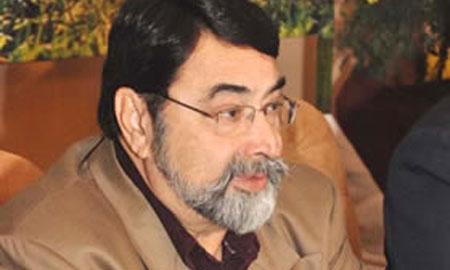Pakistan Business Council (PBC) is a business policy advocacy forum, comprising of private-sector businesses that have substantial investments in Pakistan’s economy. Mr. Sikandar Mustafa Khan qualified as a Mechanical Engineer from NED University of Engineering & Technology, Karachi in 1967. He has a Post Graduate Diploma from the University of New-Castle Upon Tyne, U.K.(1969) and Masters’ Degree & Diploma in Production Engineering (DIC) from Imperial College of Science and Technology,
London University (1970), He also attended several management courses locally and abroad, including International Advanced Management Program (1983) at International Management Institute, Geneva, Switzerland and Leadership Development Program at Center for Creative Leadership (Colorada Springs), U.S.A. In addition he participated in the Financial Management Course (1989) at Pakistan Staff College, Lahore, The Management Control Course (1990) and the Strategy for Business in Developing Countries Program(1993) at LUMS. Mr. Khan is serving on the Board of several Companies of both Public and Private Sector Companies including the Board of Habib Bank Limited, the largest private sector Bank of Pakistan. He has varied experience in the Automotive and Engineering Industry and has been associated with it since 1972. He was the Vice President of Lahore Chamber of Commerce & Industry (LCCI) for the period October 1997 to September 1998. Mr. Khan was appointed as Managing Director/Chief Executive Officer of Millat Tractors Limited (MTL) in October 1985 and was elected Chairman of the Board in 1991. In pursuance of the Privatization Policy of the Government, he successfully led his team for the Employee Buy-out of MTL. He is also the Chairman of Millat Group Companies including two associated companies; Bolan Castings Limited & Millat Equipment Limited and Millat Industrial Products Limited as a subsidiary of Millat Tractors Limited.
You are an active member of the Pakistan Business Council, a highly respected institution. You have also managed to grow Millat impressively in terms of volume and quality. Can you please share with us more information about Pakistan Business Council role in the development of the country?
Pakistan Business Council is an extremely important institution for the country. The companies that form the council contribute 15% of tax and 16 % total exports. We can give the government a true perspective of the decision making process. If we can get them to listen to us we are going to be able to work better for the benefit of the country. It is very important that Pakistan Business Council provides the government information about decision-making process. We provide the government an unbiased opinion regarding the situation of the nation. We are very active; we meet regularly foreign embassies and NGOs (World Bank, etc.) and share our thoughts.
The Pakistan Business Council (PBC) is a business policy advocacy platform, established in 2005 by 14 of Pakistan’s (now 45) largest private-sector businesses / conglomerates, including multinationals. The current CEO is Mr. Kamran Y Mirza, who brings with him considerable experience of working in the corporate sector and with the government.
The major objectives of the PBC as stated in its founding documents are:
• To provide for the formation and exchange of views on any question connected with the conduct of businesses in and from Pakistan.
• To conduct, organize, set up, administer and manage campaigns, surveys, focus groups, workshops, seminars and field works for carrying out research and raising awareness in regard to matters affecting businesses in Pakistan.
• To acquire, collect, compile, analyze, publish and provide statistics, data analysis and other information relating to businesses of any kind, nature or description and on opportunities for such businesses within and outside Pakistan.
• To promote and facilitate the integration of businesses in Pakistan into the World economy and to encourage the development and growth of Pakistani multinationals.
• To interact with Governments in the economic development of Pakistan and to facilitate, foster and further the economic, social and human resource development of Pakistan.
What would be your message for the readers of our report regarding Pakistan and its future?
Terrorism has damaged Pakistan’s image. Terrorism is something that we have been dragged into; it doesn’t belong here. We are a Muslim nation and we don’t accept or promote terrorism. The world has to help us eradicate this from Pakistan. The UK can help us eradicate this from Pakistan; we are concerned about what happens in other countries yet we are worried about our own people. We need to uplift the quality of life of our people; politicians need to focus on this. Other countries dragged Pakistan into this issue.
Pakistan is a moderate Islamic country and the general population does not support terrorism or the people involved in this activity. It is unfortunate that Pakistan has been drawn into this war on Terrorism and has become the front line state in fighting Terrorism.
We are fighting the war on behalf of the world and I feel it is incumbent on UK and the rest of the word to fully support Pakistan in its efforts to defeat Terrorism, both financially and through the supply of technology and hardware. This war has cost Pakistan billions of dollars till date.
We have a dynamic population who need to be educated and trained to participate in the development of Pakistan. 
0 COMMENTS